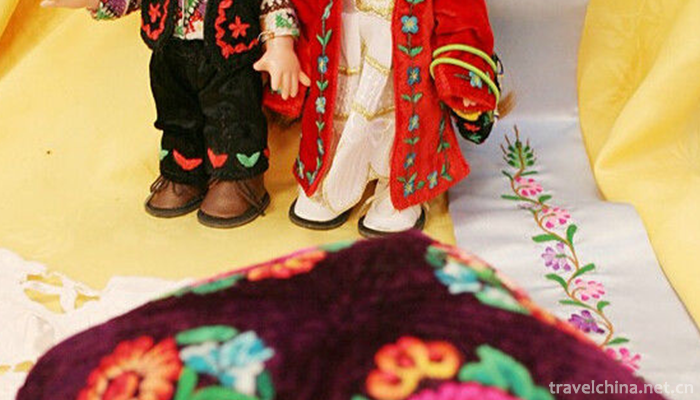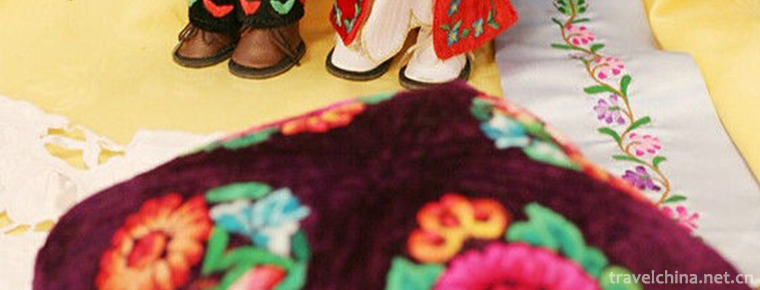Uygur Embroidery
Uygur Embroidery
Embroidery is one of the most representative decorative techniques in Uygur costumes in China. Whether it is Uygur clothes, skirts, shoes, hats and beds, the interior decorative articles adorn the exquisite embroidery of Uygur women. Uygur embroidery has accepted both the inland embroidery technology and the characteristics of its own nation, and gradually formed its own unique charm. Patterns or color matching, with strong national characteristics. It is a kind of technology that punctures the fabric with needle-piercing and thread-piercing, and organizes the lines into patterns by carrying needles according to the design pattern. It is an art that uses needles and thread to complete the pattern.
In 2008, the Uygur embroidery declared by Hami District of Xinjiang Uygur Autonomous Region was listed in the second batch of national intangible cultural heritage list with the approval of the State Council.
Historical Origin
Hami Uygur embroidery is a traditional handicraft to beautify clothes. It is the main and most common decorative method of Hami Uygur traditional clothes. It has unique charm with its complicated style and exquisite embroidery. It is a hard-working Hami Uygur women and the Uygur people have attached great importance to the embroidery technology of clothes for a long time, and it has always been regarded as an indispensable part of clothes. It should be developed and perfected to make it a unique art form of dress decoration commonly used by Uygur people. Hami Uygur traditional clothing embroidery is mainly clothing and accessories, such as gowns, shoulders, long skirts, pants, boots and hats, dozens of kinds. In the history of development and evolution, the continuous integration of various national cultures has greatly developed the Hami Uygur folk embroidery technology and gradually formed a variety of styles and characteristics of different embroidery techniques.
artistic characteristics
As a member of the family of the Chinese nation, the Uygur nationality, like other nationalities in the motherland, has formed its own distinctive national culture in the long process of historical development. In today's global economic integration, it is particularly important to maintain the regional folk culture tradition. Uygur embroidery technology, along with the Uygur people's Millennium culture, has continued to this day. With its strong national characteristics and exquisite crafts, it radiates its unique charm and is unique in the traditional folk crafts of ethnic minorities in Xinjiang. The study of Uygur embroidery technology is helpful to understand the cultural influence factors and artistic value of Uygur embroidery technology, so as to have a deeper understanding of Uygur folk traditional handicraft culture.
Current situation of inheritance
On the basis of actively promoting traditional embroidery art and combining with modern management concept, Aga Khan, the inheritor of Hui folk embroidery in Hami city, set up embroidery factories to make embroidery with national cultural characteristics go to the whole country and the world.
In the exhibition room of Afghan handicraft embroidery, there are not only her own works, but also the handicraft left by her ancestors.
"This is my grandmother's embroidered flower, this is my mother's embroidered flower, this is my own made flower," Agathan Samaiti said.
In Uygur folk, painting, paper-cut and embroidery are in the same vein. Agahan Saimati, a farmer painter from Hami city, is the fourth generation of family embroidery. Her grandmother was an embroidery worker in Hami's Royal palace. Hami Uygur embroidery integrated the skills of Beijing embroidery and Su embroidery. The images of peony, chrysanthemum and dragon appear in embroidery patterns. Agathan Samaiti began to learn paper-cut, embroidery and painting at the age of 7. As a minority peasant woman, her works mainly show the life of peasants. Spring sowing, which won the first prize in the 1988 National Farmers'Painting and Calligraphy Exhibition, is a work of expressing rural life. With the development of the times, more and more peasant embroidery products begin to be recognized by the society and accepted by the public. People like peasant embroidery products because it emits a simple fragrance. Land is the life of peasants, and works are peasants'dreams. There are works in life and life in works. They hold embroidery products with true feelings in their hands, hang them on the wall, see them in their eyes and enjoy themselves in their hearts. While conveying beauty, they also share the happiness of life with more people.
Inheritance Significance
Uygur embroidery technology has remarkable inheritance and blending, which also contains rich cultural anthropological information. The great differences between the natural environment and social conditions of Uygur people make the embroidery techniques of Uygur people in different areas of Xinjiang have different regional characteristics. In the long history of development, Uygur embroidery technology has formed its own unique style, which carries heavy traditional culture and national spirit, and embodies the brilliant material civilization of Uygur. To promote and expand and enrich the research of Uygur embroidery technology in modern design has a certain practical significance for enriching the modern process design system. The study of Uygur embroidery technology as a carrier of national culture can help us better protect and inherit national culture and protect the diversity of human culture in the era of globalization.


-
3.Longtan Park
Longtan Park is located opposite Longtan Beili District, Dongcheng District, Beijing (Chongwen District), and is currently a national 4A-level tourist park. Longtan Park
Time 2019-02-06 -
4.Qianling Mountain Park
Qianling Mountain Park is a comprehensive tourist park, built in 1957, located in the northwest corner of Guiyang City. It is named Qianling Mountain because of its "first mountain in southern Gu
Time 2019-02-07 -
5.Xigaosong Scenic Spot
Xiqiaosong Scenic Area is located at the foot of Tianjing Mountain, 13 kilometers west of Chengxian County, in the middle of Yuqiaoxia, a national AAAA-level tourist attraction
Time 2019-02-25 -
6.Korean Crane Dance
Crane Dance of the Korean Nationality has a long history and is a unique dance performance form of the Korean Nationality in China. It has the national characteristics and the value of artistic resear
Time 2019-04-16 -
7.Ancient Platform Building Skills
Architectural skill of ancient stage is an important traditional skill in folk architecture. In the traditional techniques of ancient stage construction, sawyers, big woodworkers, small woodworkers
Time 2019-05-01 -
8.Surface painting
Water and land painting Festival is a traditional religious painting. Originated in the Three Kingdoms Period, Buddhist monasteries prevailing from the Jin Dynasty to the Yuan, Ming and Qing Dynasties
Time 2019-06-15 -
9.Celadon Firing Techniques of Yue Kiln
The firing history of celadon in Yue kiln has gone through the firing process of primitive, primitive and mature ceramics kilns and mature ceramics kilns (i.e. ceramics kilns). In the firing process,
Time 2019-07-16 -
10.Bruce Lee
Bruce Lee (November 27, 1940 -1973 July 20th) Lee Jun Fan Teacher Ye Wen Born in California, USA San Francisco The ancestral home of China Guangdong Province Foshan City Shunde District Junan Town The
Time 2019-09-04 -
11.Cao Pi
Wei Wendi Cao Pi (187 - 26 June 29th) Zi Wan Pei Guo Qiao County, Yuzhou City (now Anhui Province Bozhou City People. Three Kingdoms period Famous Politician , Litterateur , the Wei state of the Three
Time 2019-09-15 -
12.Bowang mountain
Bo (B ó) Wang mountain, also known as Bowang mountain. Bowang mountain is one of the most important breeding and living places of the ancient Bo nationality. It was known as lunzhudadun and shitoudazhai in ancient times
Time 2020-10-16